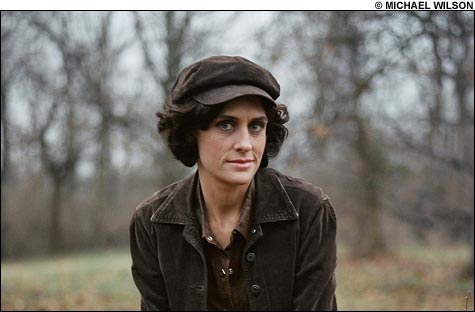Jenny Scheinman gets herself together
By JON GARELICK | June 2, 2008

INSTRUMENTAL: “My whole life has been unspoken,” says the violinist of her first vocal album. |
WFNX Jazz Brunch Top 5
1. Marcin Wasilewski, January [ECM]
2. Esperanza Spalding, Esperanza [Heads Up]
3. John Ellis, Dance like There’s No Tomorrow [Hyena]
4. Revolutionary Snake Ensemble, Forked Tongue [Cuneiform]
5. DJ Logic/Jason Miles, Global Noize [Shanachie] |
Jenny Scheinman is such an unassuming, modest musician that it’s easy to underestimate the radicalness of her two new CDs, Jenny Scheinman and Crossing the Field. It’s not simply the proximity of the release dates. (The first disc is out now on Koch, the other is available on vinyl and as a download and will come out on CD sometime in the fall.) It’s not even that the first is a vocal record and the second instrumental. Neither is it the differences in style. The first mixes country, folk, rock, and blues; the latter is an amalgam of jazz improvisation and open-form composition — Ellington’s “Awful Sad” is here, and so are Scheinman’s takes on American hymn tunes, parlor ditties, Kurt Weill, circus music, African guitar pop, and 20th-century classical modernism. That in itself covers a lot of ground. But compare her plainspoken delivery of Mississippi John Hurt’s “Miss Collins” on Jenny Scheinman with the frightening threnody of clashing strings and throbbing drone in her “Einsamaller” from Crossing the Field. This isn’t like Esperanza Spalding going from a free-piano jazz trio to a jazz-pop vocal album, or Herbie Hancock writing a “jazzy” film score. It’s not even the difference between Pat Metheny and the Art Ensemble of Chicago. It’s more like the difference between Maybelle Carter and Alban Berg.Eclecticism is such a given these days that it’s almost a red flag — another word for dilettante. But Scheinman has come by her eclecticism honestly, and as you cozy up to the two CDs, it’s soon clear that they’re part of the same sensibility — someone enamored of “American music,” whatever that is. The sound of Scheinman’s Americana style is recognizable, but her radicalism has as much to do with audiences, performing traditions, and an attitude toward the marketplace.
Scheinman, who plays the MFA this Saturday night, has been a comer for the past decade or so — mostly as a violinist playing in bands led by Norah Jones, Lucinda Williams, Bill Frisell, Madeleine Peyroux, and the Brazilian guitarist and singer Vinicius Cantuária. In the meantime, she’s been releasing her own records, exploring her travels in Eastern European folk and klezmer and all manner of Latin-American music. But on 2006’s 12 Songs (Cryptogramophone), she more or less zero’d in on the American-ness of her sound — 12 instrumentals that in some cases seemed to cry out for lyrics.
Now, writing different songs, she’s come up with some. Four of the 11 songs on Jenny Scheinman are originals: stories of an aunt who disappeared (“The Green”), an enigmatic drifter (“Skinny Man”), an isolated country family (“Newspaper Angels”). And there’s the one full-on guitar-rocker, “Come On Down,” an invocation, a plea for love or at least salvation.
 Related
Related:
Jenny Scheinman, Border crossings, The band's the thing, More 
- Jenny Scheinman
You might recognize Jenny Scheinman’s name from the liner notes of one of the many high-profile releases on which she’s appeared as a jazz violinist.
- Border crossings
An in-demand sidewoman brings her own thing to Newport. Jenny Scheinman, "Into the Clearing" (mp3) Jenny Scheinman, "Tango for Luna" (mp3)
- The band's the thing
Jenny Scheinman has become the go-to gal for mixed-genre violin.
- Budding groves
More and more, museums are getting into the live-music scene.
- Fearful asymmetry
Carla Bley’s local appearances are so rare that each one is an event.
- Anat, Elvis, and Jenny
In the wake of a single solo album on her own label in 2005, Anat Cohen is suddenly everywhere.
- 52 ways to leave 2009
Your usual lackadaisical approach to New Year's Eve — just see what happens and go with the flow — is not going to cut it this year. Sure, the end of this decade may not have the same kind of new-millennium pressure riding on it as the last one, but the plunge into 2010 is a milestone nonetheless.
- Vetiver + Phosphorescent
Houck looked nothing like Bonnie Prince Billy or the more emotionally tortured freak-folkies he’s usually lumped with.
- Out of Africa
Writing about Extra Golden, you’re tempted to focus on the novelty: two indie-rock dudes taking off to Nairobi to jam with a pair of benga masters sounds like the premise for some awful Jack Black movie. (Please don’t please don’t.)
- Crossing over again
The latest assault on the jazz crossover audience comes to town this Saturday in the form of “What Is Jazz?”, a touring caravan headlined by the Christian McBride Band with support from the Charlie Hunter Trio and drummer Bobby Previte with DJ Logic.
- Wandering star
Cleaning the kitchen of her Brooklyn apartment a few weeks ago — shortly before hitting the road in support of her fourth full-length, The Living and the Dead (Anti-) — singer-songwriter Jolie Holland was struck by an idea for her fifth album.
- Less

 Topics
Topics:
Jazz
, Jimmy Reed, Maybelle Carter, Jason Moran, More  , Jimmy Reed, Maybelle Carter, Jason Moran, Django Reinhardt, Todd Sickafoose, Ron Miles, Adam Levy, DJ Logic, Marcin Wasilewski, Vinicius Cantuaria, Less
, Jimmy Reed, Maybelle Carter, Jason Moran, Django Reinhardt, Todd Sickafoose, Ron Miles, Adam Levy, DJ Logic, Marcin Wasilewski, Vinicius Cantuaria, Less 